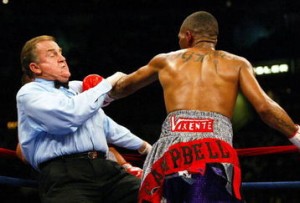By Dan Rafael of ESPN
The Nevada State Athletic Commission adopted two major rules changes at its meetings in Las Vegas on Wednesday that could have a significant impact on boxing in the fight capital of the United States.
 In two 5-0 votes, the commission approved the use of instant replay for boxing and mixed martial arts bouts and also amended a rule that previously did not allow fighters in either sport to apply for a license in the state if they had previously suffered a cerebral hemorrhage.
In two 5-0 votes, the commission approved the use of instant replay for boxing and mixed martial arts bouts and also amended a rule that previously did not allow fighters in either sport to apply for a license in the state if they had previously suffered a cerebral hemorrhage.
Both new rules are expected to go into effect in September, said Keith Kizer, the executive director of the Nevada commission. He said both must be approved by the Nevada’s Legislative Counsel Bureau, which will make sure neither violates any state statutes.
“They’ll look at them and they’ll file them with the state librarian,” Kizer said. “Bottom line is that within 30 days they should be on the books.”
The Sept. 19 Floyd Mayweather-Juan Manuel Marquez card at the MGM Grand is the first significant boxing show in the state under which replay could be used.
“Mayweather-Marquez will either be the first under the new regulations or the last under the old regulations,” Kizer said.
The use of instant replay was adopted on a limited basis and will be at the sole discretion of the referee. Kizer said it will be used only when an injury forces a fight to be stopped.
“An eye poke, a cut, something along those lines,” Kizer said. “The cut happens, the fighter cannot continue and the referee makes a call whether it was caused by a punch or a head butt. If he feels the use of replay will help him be sure, he can review it. It’s no different than the NFL. If the replay is inconclusive, the initial call stands.”
Replay will not be used, Kizer said, to determine such things as whether a knockdown is caused by a punch or was a slip.
“I like the accuracy it can provide,” said Todd duBoef, the president of Las Vegas-based promoter Top Rank. “As long as the use of replay does not jeopardize the action of the contest, I think it will be a good thing and very healthy for the sport.”
Featherweight contender Rocky Juarez, who challenges Chris John for his title on the Mayweather-Marquez undercard, also supports the use of replay.
“I believe it is a good thing,” Juarez said. “A lot of times fights are stopped where there’s a head butt and you don’t know if it was accidental or intentional. Replay clears that up.”
Since 1972, Nevada rules prevented a fighter who had suffered a head injury, such as a subdural hematoma (bleeding on the brain), from applying for a license, even if the injury was not related to fighting and there was no longer evidence of it in medical testing.
That rule is what prevented fighters such as heavyweight Joe Mesi and lightweight titlist Edwin Valero from asking Nevada for a license after injuries.
But with advances in medical technology, the commission revisited the rule and took its unanimous vote after a recommendation from Dr. Albert Capanna, a neurosurgeon and chairman of Nevada’s medical advisory board, which also approved of the rule change.
It is significant for Valero, who suffered a head injury in a 2001 motorcycle accident. He turned pro in 2002 and fought without any issues but was denied a license in New York when he failed a prefight MRI in 2004. New York placed him on the indefinite suspension list. Other states honored the ruling as suggested they do under the rules of the Association of Boxing Commissions.
Valero eventually continued his career in Japan and won a junior lightweight title. In March 2008, Valero was granted a license in Texas, which had him submit to a battery of tests before allowing him to fight there. In April, Valero fought in Austin, Texas, and knocked out Antonio Pitalua in the second round to claim a lightweight title.
But Valero wants the bigger money fights that are usually associated with Las Vegas. His promoter, Top Rank, has designs on putting him in a significant bout on the Nov. 14 Miguel Cotto-Manny Pacquiao undercard.
Now, Valero, and any other fighter in a similar situation, can at least apply for a license. The commission will consider each fighter on a case-by-case basis.
“A lot of things have changed since 1972 in terms of medical testing,” Kizer said. “We have a better ability to scan and some scans didn’t even exist in 1972. The commission is not changing its view of these injuries, just changing so we can utilize modern medicine in making a determination. Anyone with a hemorrhage history would have to go before the medical advisory board and probably get a ton of different tests and then the commission would make its decision. Just because you can apply now doesn’t mean it’s going to be easier to get a license if you’ve had a hemorrhage.”
Valero’s MRI films were sent to the commission months ago in anticipation of the rule change. Kizer said Capanna was encouraged by the initial review of the films, but Valero will have to submit to extensive testing and a review by the medical advisory board and commission before he is granted a license.
“I think the change of the rule is the commission adapting to use information that is available,” said duBoef, Valero’s promoter. “There have been many medical experts that believe that there is not enough evidence to prohibit a fighter from participating in a contest if they have had a previous cerebral hemorrhage. We’ve seen a number of participants who have fought after a cerebral hemorrhage and had good careers. Now at least Nevada will consider the application.
“We’ll explore the process to get Valero a license in the state of Nevada,” duBoef said. “We’ll go through the inspections and battery of tests in order to get him licensed. Nevada should be commended for getting up to date and modernizing the commission’s rules.”
Dan Rafael is ESPN.com’s boxing writer.

